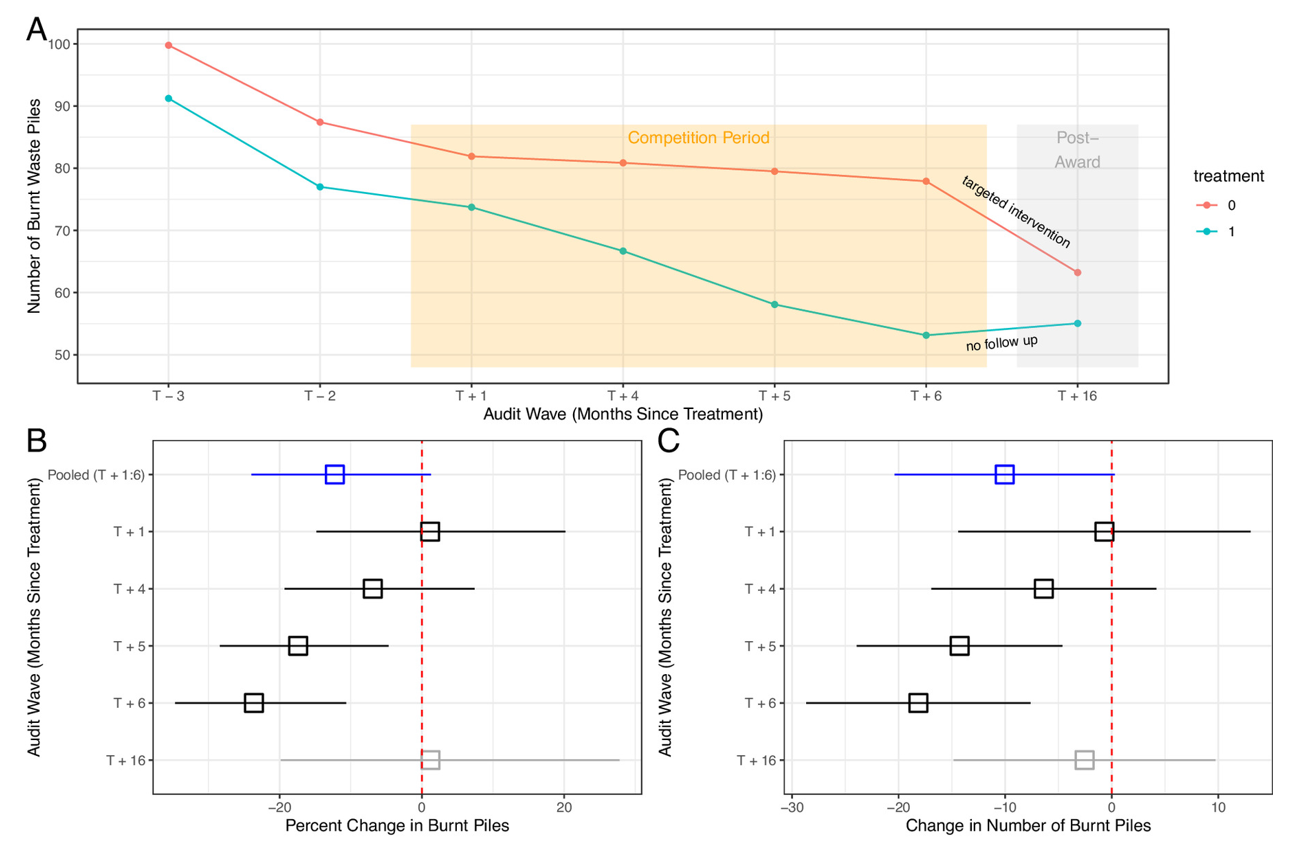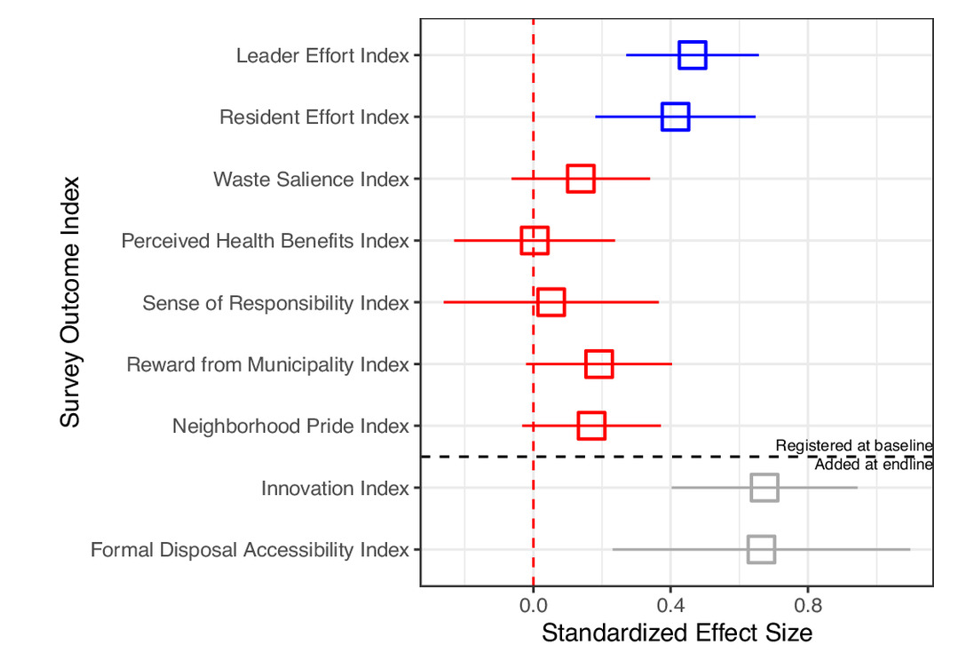
Social competitions between neighbourhoods galvanise leadership and inspire collective action to reduce informal waste burning in urban Uganda
Urban air pollution is a major public health risk across the Global South. In Uganda, urban regions grapple with perilous levels of air pollution throughout the year (Okure et al. 2022), increasing the risk of respiratory, cardiovascular, metabolic, and other diseases among residents (Schwander et al. 2014). Reducing urban air pollution would improve public health and reduce mortality, but is a challenging problem to address.
The informal burning of household waste is a significant public health issue in urban Uganda
A prominent cause of urban air pollution comes from the informal burning of household waste (Schwander et al. 2014, Kodros et al. 2016). Governmental bodies often lack resources to enforce pollution regulations (Joshi and Moore 2003) and formal systems to dispose of household waste are frequently unavailable or unreliable. These limited systems are further strained by an increasing population size and rapid urbanisation. Combined, these factors lead residents to informally burn household waste along roadways and alleys in residential areas.
Even as the coverage of formal waste disposal services has expanded, the practice of informally burning household waste has been remarkably persistent. This is likely because transitioning to formal disposal requires residents to pay a fee and bring their waste to collection points. Without regulatory enforcement, communities and leaders need to unite around common goals and convince individuals to bear personal costs for the collective benefit of better air quality (Ostrom 1990). What strategies can communities and leaders employ to achieve this aim? Are there social interventions that can be utilised to reduce informal waste burning without monetary incentives? Comparison, competition, and recognition can encourage socially beneficial behaviours (Allcott and Rogers 2014, Gjedrem and Kvaløy 2020, Ta 2024), but can these be used to motivate behavioural change in large groups of people in the Global South? To address these questions, we explore using social competitions to reduce the informal burning of household waste in Uganda (Buntaine, Komakech and Shen 2024).
Empowering local leaders to inspire collective action through social competitions
Local leaders can powerfully shape local air quality through their ability not only to influence activities in high-polluting sectors (Shen 2022), but also their capacity to organise group-level actions. We set up study sites in 44 neighbourhoods (zones) in the Nansana Municipality of Uganda with confirmed access to formal waste disposal and the consent of their leaders to participate in efforts to reduce informal burning.
All zones received a public health messaging campaign about the harmful effects of informal waste burning and half of the zones were assigned to participate in a pair-wise competition between zones to minimise waste burning over an 8-month period (Figure 1). Progress was assessed through repeated audits of transects in the study locations, with the competition’s status periodically announced within the zones by loudspeakers mounted on trucks. At the end of the competition, the winning neighbourhood in each pairing received a certificate from municipal authorities.
Figure 1: Map of data collection tracks in the study area.

We found that neighbourhood competitions substantially reduced informal waste burning. Over the entire study period, the average reduction across all audit waves was 12%, though this grew to a 24% reduction in waste burning by the end of the competition period (Figure 2). Additionally, we found that new piles of waste were no more likely to emerge in less visible spots during the competition period. There were no notable changes in enforcement by municipal authorities during the study period. These results indicate that new practices took hold and that there was a substantial transition to formal waste disposal, as opposed to a transitory response at the beginning of the competition period or a shift in moving burn piles to less visible locations.
Figure 2: Results of the pairwise competitions on informal waste burning

Even without a monetary incentive or increased regulations, there was a significant reduction in informal waste burning. Importantly, we found this reduction in waste burning continued after the neighbourhood competitions ended. Specifically, approximately ten months after the final audit during the experimental period and eight months after dissemination of the awards to the winners of the pairwise competitions, the zones maintained similar levels of waste burning from the end of the competition. The municipal authorities in Nansana even took up the intervention on their own and saw reductions in informal burning in the control neighbourhoods.
Why did social competition reduce informal waste burning?
As part of our research, we also conducted a survey of local leaders, such as elected chairs, vice chairs, and neighbourhood council members, and interviews with the local leaders in the two highest and the two lowest performing zones in each of the treatment and control groups. We found that the competition increased the efforts of zone leaders to coordinate residents and promote the shift away from informal waste burning (Figure 3). For example, local leaders worked to negotiate more consistent schedules with the service providers and some zones implemented “cost-sharing” systems where zone members who had already paid for the services would take their neighbours’ trash to the collection trucks along with their own. Leaders from the competition zones also noted that their residents made more effort to transition to formal waste disposal practices. We also found that leaders' sense of neighbourhood pride increased when participating in a social competition. These results indicate that the competitions helped to mobilise leaders and incentivise community members to reduce informal waste burning.
Figure 3: Results of the competitions on leader effort, perceptions, and attitudes.

The promise of social competition to spark collective action
Social competitions led to significant reductions in informal waste burning, without needing increased enforcement or monetary incentives. Our results are particularly relevant to using competitions as a way to engage community leaders, a strategy that is finding broader application (Tidwell et al. 2019). To our knowledge, our study is the first to show how competitions without material incentives can offer a focal point for collective action by large groups. Additionally, while other behavioural interventions have seen compliance fatigue, such as physical distancing during the COVID-19 pandemic (Petherick et al. 2021), or rebounds in a similar time frame, such as during targeted interventions for household energy savings (Allcott and Rogers 2014), we saw enduring behavioural change both during and after the competition ended. We posit that competitions are potentially unique as a team-building approach that focuses on creating a shared purpose and motivation among an existing social grouping. Our study suggests that they can be excellent complements to policies that aim to foster significant behavioural changes, at least when information (public health campaign) and behavioural skills (sharing of best practices) are provided as part of a complementary bundle (Ehret et al. 2021).
Overall, our study demonstrates the promise of social competition to spark collective action, instigate leader effort, reinforce new social norms, and facilitate a longer-term transition to new behaviours by the public. Furthermore, with modest staffing needs and a low per capita cost, social competitions are a low-cost strategy to incentivise change and a promising intervention for wider adoption. As if to prove the point, the Nansana Municipality took up the basic intervention without financial or technical support after our intervention had concluded and saw major declines in waste burning in the control group. Local governments can use social competitions quickly, cost-effectively, and independently to facilitate collective action by leaders and residents.
References
Allcott, H and T Rogers (2014), "The short-run and long-run effects of behavioral interventions: Experimental evidence from energy conservation", American Economic Review, 104: 3003–3037.
Buntaine, M T, P Komakech, and S V Shen (2024), "Social competition drives collective action to reduce informal waste burning in Uganda", Proceedings of the National Academy of Sciences, 121(23): e2319712121.
Ehret, P J et al (2021), "Systematic review of household water conservation interventions using the information-motivation-behavioral skills model", Environment and Behavior, 53: 485–519.
Gjedrem, W G and O Kvaløy (2020), "Relative performance feedback to teams", Labour Economics, 66: 101865.
Joshi, A and M Moore (2004), "Institutionalised co-production: Unorthodox public service delivery in challenging environments", Journal of Development Studies, 40: 31–49.
Kodros, J K et al (2016), "Global burden of mortalities due to chronic exposure to ambient PM2.5 from open combustion of domestic waste", Environmental Research Letters, 11: 124022.
Okure, D et al (2022), "Characterization of ambient air quality in selected urban areas in Uganda using low-cost sensing and measurement technologies", Environmental Science and Technology, 56: 3324–3339.
Ostrom, E (1990), Governing the Commons: The Evolution of Institutions for Collective Action, Cambridge University Press.
Petherick, A et al (2021), "A worldwide assessment of changes in adherence to Covid-19 protective behaviours and hypothesized pandemic fatigue", Nature Human Behaviour, 5: 1145–1160.
Schwander, S et al (2014), "Ambient particulate matter air pollution in Mpererwe district, Kampala, Uganda: A pilot study", Journal of Environmental and Public Health, 2014: 1–7.
Shen, S V (2022), The Political Regulation Wave: A Case of How Local Incentives Systematically Shape Air Quality in China, Cambridge University Press.
Ta, C L (2024), "Do conservation contests work? An analysis of a large-scale energy competitive rebate program", Journal of Environmental Economics and Management, 124: 102926.
Tidwell, J B et al (2019), "Effect of a behaviour change intervention on the quality of peri-urban sanitation in Lusaka, Zambia: A randomised controlled trial", Lancet Planetary Health, 3: e187–e196.



